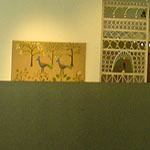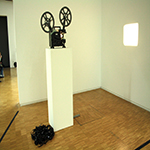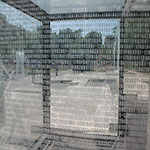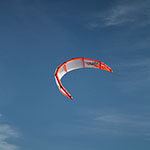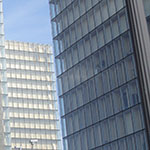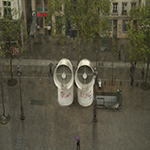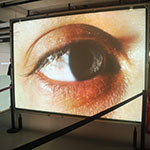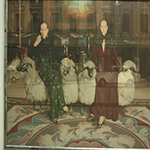Electra Palace Hotel
18-20, N. Nikodimou Str. 10557 Athens, GreeceConference Agenda
- May 23, 2014
- 09:00 - 09:30Registration (Reception Desk – Foyer)
- 09:30 - 10:30Welcome and Opening Remarks / Opening Workshop: Europeaness Exposed to Plural Observers
- 10:30 - 11:00Coffee Brake and Snacks
- 11:00 - 13:00Panel 1: Thinking Europe: Philosophy, Autonomy and Culture (Chair: Emanuel Crudu, IMT Institute for Advanced Studies, Lucca)
- 13:00 - 14:30Lunch - Motivo Restaurant (Electra Palace)
- 14:30 - 16:30Panel 2: The European Way: Identitarian Representations of Europe in Visual Arts, Performing Arts and Literature (Chair: Lorena Morales, Institute for Doctoral Studies in the Visual Arts, Fairfield, USA)
- 16:30 - 17:00Coffee Brake and Snacks – Foyer
- 17:00 - 19:00Panel 3: Europe and Identities: Inclusion and Exclusion Nexuses (Chair: German Mendzheritskiy, Librarium Archives Russe de la Presse Ancienne)
- 19:00 - 19:45Welcome Drink and Snack (Electra Palace - Atrium)
- 19:45 - 21:30Optional Social Dinner
- May 24, 2014
- 09:00 - 11:00Panel 4: Europe and the European Union: The Multiple Faces of Europeanization as a Process (Chair: Emanuel Crudu, IMT Institute for Advanced Studies, Lucca)
- 11:00 - 11:30Coffee Brake and Snacks – Foyer
- 11:30 - 13:30Panel 5: Europe and Its Internal and External Others: Europeanization and Migration (Chair: Ekaterina Bagreeva, Russian Economic University of G. V. Plekhanov, Moscow)
- 13:30 - 15:00Lunch at Motivo Restaurant (Electra Palace)
- 15:00 - 17:00Panel 6: European Politics and Economic Development: The Domestic Dimension - Opportunities and Distortions (Chair: Gerhard K Eichweber, Value Group, Switzerland)
- 17:00 - 17:30Coffee Brake and Snacks – Foyer
- 17:30 - 19:00Panel 7: The European Way: Identitarian Representations of Europe in Visual Arts, Performing Arts and Literature (Section Two)
- 19:00 - 19:30Concluding Remarks and Discussions
- 19:30 - 21:30Optional Social Dinner
- May 23, 2014
The 4th Euroacademia Global Conference ‘Europe Inside-Out: Europe and Europeaness Exposed to Plural Observers’
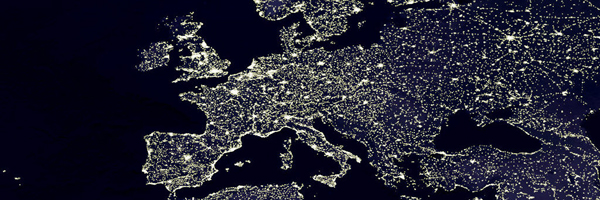
- Conference Description
- Participant’s Profile
- Registration and Fee
- Social Activities and Publication
- Important Dates
- Venue and Directions
- Conference Program
- Panel 1
- Panel 2
- Panel 3
- Panel 4
- Panel 5
- Panel 6
- Panel 7
The 4th Euroacademia Global Conference
Europe Inside-Out: Europe and Europeaness Exposed to Plural Observers
23-24 May 2014, Athens, Greece
5* Electra Palace Hotel
Conference Description:
Europe became in the 20th century an elaborated yet contested notion as a particular field of European studies emerged and extensive and diverse research was directed recently towards an intensified search for what Europe is about. The creation of the European Union made things even more specialized and increased the stake of methodological rigor as more and more Europeans are affected by the decisions taken in Brussels. The number, diversity and quality of research projects focused on European issues is unprecedented, yet, as it is usually the case with specialization it gradually led to discursive communities that rarely meet and debate their approaches in open floors together with peers from other continents, academic traditions and cultures. It is the aim of this conference to build a bridge among specialists from different regions, academic traditions and cultures that share a common interest in studying and addressing Europe as a reflexive concern.
The 4th Global Conference ‘Europe Inside-Out: Europe and Europeaness Exposed to Plural Observers’ aims exactly to refresh a broader approach and understanding of Europe by enlarging the platform of regular conferences and workshops for a wider arena of participants and disciplinary backgrounds in order to put on stage a worldwide monadology for such concerns. The conference aims to enable critical alternatives to the disciplinary orthodoxy by creating a framework for interaction and dissemination of diversity that has to become once more a European trademark. The conference also aims to become a constructive confrontational space for alternative methodologies, provocative puzzles, inter, multi and trans-disciplinary understandings for wider and also for thinner specialized issues of concern on or about Europe of today. In a way, such a conference aims to become a moment of return to the European specificity of critical self-understanding through dialogue and debate with all the discursive or narrative traditions that directly or indirectly constitute its self.
What is Europe and its place in the world? Is there something particular that sedimented in time and through a controversial history a European way? How does Europe see itself and how do others see it? Is Europe inclusive or club-based exclusive? Is Europe becoming a normative power or just envisages itself as one? Is the European multiculturalism a fact or an ideal? Is the European Union a reflection of Europe or an appropriation of it? These are just few questions out of an enormous space for inquiry that are to be addressed and confronted within the topic of the conference.
The 4th Euroacademia Conference ‘Europe Inside-Out: Europe and Europeaness Exposed to Plural Observers’ became a regular event to take place in every year in a different European location. After three successful editions – the first one in Vienna, the second in Paris and the third in Prague – Euroacademia moves the stage of reflection, sharing, dialogue, debate and research dissemination on Europe to its origins where the specificity of European thinking and world vision has emerged: in Athens. Join us!
Participant’s Profile
The conference is addressed to academics, researchers and professionals with a particular interest in Europe, Europe related and European Union topics from all parts of the world. As the nature of the conference is intended to be multidisciplinary in nature different academic backgrounds are welcomed. Cultural approaches, political studies, critical studies and artistic/literary contributions to the better understanding of Europe in its past present and future dimensions are welcomed.
Post-graduate students, doctoral candidates and young researchers are welcomed to submit an abstract. Representatives of INGOs, NGOs, Think Tanks and activists willing to present their work with impact on or influenced by specific understandings of Europe and/or the European Union are welcomed as well to submit the abstract of their contribution.
Abstracts will be reviewed and the participants are selected based on the proven quality of the abstract. The submitted paper for the conference proceedings is expected to be in accordance with the lines provided in the submitted abstract.
Registration and Fee
Registration is now closed
The Participation Fee Includes:
- the registration fee
- participant’s package with all the materials for the conference
- inclusion in the conference proceedings published volume
- a copy of the electronic volume
- access to Euroacademia discussion group and newsletters
- discounted rates for participation in the future Euroacademia conferences
- coffee brakes with snacks for all the duration of the conference
- a 3 course lunch on 23rd of May 2014 at the 5 stars Motivo Restaurant
- welcome drink reception with snacks on 23rd of May 2014
- a 3 course lunch on 24th of May 2014 at the 5 stars Motivo Restaurant
- certificate of attendance
- access to discounted rates for accommodation at the 5* Electra Palace Hotel
- optional social program
Unfortunately, Euroacademia has no available funds for covering transport and accommodation to/in Athens. Participants are responsible for finding funding to cover transportation and accommodation costs during the whole period of the conference. Official invitation letters can be sent by Euroacademia to the financing institution to confirm the selection and participation in the conference upon request.
A specific spot in the conference program will be dedicated to social networking and therefore all the participants interested in setting or developing further cooperation agendas and prospects with other participants will have time to present and/or promote their project and express calls for cooperation.
A specific setting (Social Corner) for promotional materials connected with the topic of the conference will be reserved for the use of the participants. Books authored or edited by the participants can be exhibited and promoted during the whole period of the conference and can also be presented within the conference package based on prior arrangements.
An optional dinner and a social event will be organized for the second evening of the conference in a typical Greek cuisine Restaurant as optional program for the willing participants. The social dinner will be held based on participant’s confirmation and it costs around 20 Euro to be covered by participants.
Publication:
Selected papers will be published in an electronic volume with ISBN after the confirmation of the authors and a double peer-review process based on an agreed publication schedule. All the papers selected for publication should be original and must have not been priory published elsewhere. All participants to the conference will receive a copy of the volume.
Specific selected papers will be also published in CEJISS (Central European Journal of International & Security Studies)
About CEJISS
Formally launched in January 2007, CEJISS is designed as a double-destination scholarly bridge. The first bridge was constructed with Central Europe (Czech Republic, Hungary, Poland and Slovakia) in mind, focusing on increasing the audience for Central European scholars. In this regard, CEJISS is making a substantial impact as each issue attracts attention in some 45,000 people in nearly 160 countries. However, CEJISS is not Central European centric and invites scholars from around the world to contribute. This has meant that just as Central European scholars now have an easier time gaining a footing outside of the region, so international scholars also have an easier time getting in and making an impact here. With a mere two decades separating our times from the ‘darker’ Cold War years, CEJISS aims to contribute English language perspectives to the peoples of Central Europe and give the latter the amplification their research deserves.
| Important Dates | |
|---|---|
| 15th of March 2014 | Deadline for Submitting Panel Proposals |
| 25th of April 2014 | 300 words abstracts and details of affiliation |
| 27th of April 2014 | Latest notification of acceptance |
| 29th of April 2014 | Sending the Registration Form |
| 5th of May 2014 | Payment of the conference fee |
| 10th of May 2014 | Sending the draft paper to be uploaded on the conference website |
| 15th of May 2014 | Publication of the conference program and uploading the draft papers on the website |
| 23rd of May 2014 | The conference commences at 9.30 am |
Venue and Directions
The conference will take place in the conference premises of the exclusive 5 stars luxury Electra Palace Hotel, centrally located in the heart of Athens, easily accessible from the historic center and within a walking distance from all the major tourist attractions. The Electra Palace Hotel -Athens is a five star property under the shadow of the Acropolis, in the picturesque quarter of Plaka, walking distance from the new Acropolis Museum. Electra Palace Hotel is an iconic trademark of Greek luxury and exquisite services being rated by Tripadvisor among the best hotels in Athens while the hotel’s Roof Garden Restaurant, will entice everyone with the exquisite taste while overlooking the Acropolis and the old Athenian town of Plaka
Electra Palace Hotel
18-20, N. Nikodimou Str., 10557 Athens, Greece
Tel: +30 210 3370000,
Fax: +30 210 3241875
email: [email protected]

Athens is one of the most important international destinations. For centuries Athens has been a major attraction due to its long and important history, but also due to its impact on the modern world. Thousands of books have been written about Athens and the civilization born here thousands of years ago, when Athens was the invincible city-state and absolute ruler of the Mediterranean.
Built at a particularly privileged location, at the crossroads of Europe, Asia and Africa, for thousands of years Athens has been attracting visitors from all over the world, being the cradle of democracy, arts, letters, philosophy, the most important creations of man, but also home to some of the most prominent founding fathers of modern European history. The historic battles which took place here decided the fate of today’s free Europe, while the modern Olympics and particularly the Marathon – an eternal message of human will and sacrifice – are intertwined with Athens and its history.
Today, the ancient, the modern and the old city, as well as the recent areas of the city built over the last decades, harmoniously coexist creating the ultimate experience for all visitors. The ancient buildings (grand and still functional, incorporated in the everyday life of Athenians), the old neighborhoods (picturesque, traditional, lively and friendly, bursting with young people and visitors), and the cosmopolitan aspect of Athens (on the pulse of modern European capitals) allow for countless combinations and promise a variety of experiences, images, flavors, markets, actions, destinations… An all-encompassing city which invites you to discover, explore and live its experience.
See full information about the conference Location & Map:
HERE
Conference participants are responsible for arranging the accommodation and travel. However, discounted rates for the ELECTRA PALACE HOTEL-Athens can be arranged by organizers and announced to selected participants upon request.
See the conference panels with abstracts below by clicking on the panel no.
Thinking Europe: Philosophy, Autonomy and Culture
(Chair: Emanuel Crudu, IMT Institute for Advanced Studies, Italy)
- Europe’s Early Encounters with Eastern Thought: SchopenhauerThis paper will elucidate the connection between Schopenhauer's system and Buddhism and Vedanta and will examine whether his interpretation was valid and whether it contributed toward a trans-cultural understanding within philosophy of the nineteenth century Europe.R. Raj Singh, Brock University, Canada
- The Notion of Dignity in European CultureThis paper argues that personal dignity, or a dignified moral orientation, results from a constancy of intellectual efforts aimed at a positive expression of individuality in a given community. It makes the point that dignity is a feature of the moral character that attaches to the individual who strives to make an honest use of talents to live a respect filled existence.Louis Chenard, Independent Researcher, Ontario, Canada
- “This Whole Great Universe Serves as a Theatre”: Pan-European Trojan OriginsIn this excerpt from his 1588 essay “Of the most outstanding men,” Michel de Montaigne describes Homer’s influence as contributing to a Europe-wide contemporary social phenomenon. These observations call attention to three central elements linking Troy with the historical imaginary of late sixteenth-century Europeans: the remarkable popularity of the Troy legend.Peter Latka, University of Toronto, Canada
- Europe as a Category of Thought: Autonomy as an Unfinished ProjectThis paper aims to revisit precisely this patrimony of critical thinking. It is the belief implicit in this paper that contemporary understandings of Europe should be placed more firmly within this tradition of aspiration for autonomy as putting into question the imaginary institutions of the society and their emanated representations and shake the walls of their cognitive closure. This is because, autonomy as unlimited questioning is a premise and not an outcome of European culture.Emanuel Crudu, IMT Insititute for Advanced Studies
The European Way: Identitarian Representations of Europe in Visual Arts, Performing Arts and Literature
(Chair: Lorena Morales, Institute for Doctoral Studies in the Visual Arts, Fairfield, USA)
- Europeaness vs. Non-Europeaness: ‘Europe’ as Category of Collective Self-Description in Spanish and Portuguese LiteratureConsidering the reference to ‘Europe’ and ‘European’ in Spanish and Portuguese literary texts, this paper aims at giving an answer to the principle questions: What kind of configurations of the world and which ideas of community and diversity are transmitted via ‘Europe’ as category of collective self-description? And: To what extent ‘Europe’ serves as instrument of politicization of collective identities?Lydia Schmuck, University of Hamburg, Institute of Political Sciences, Germany
- Greek Symbolism: The Quest of its European Identity: The Representation of a Movement in the Hellenic ArtThe goal is to demonstrate how are the subjects of the thematics, the style and the expression of Symbolism, as we find them in the European centres, traced in the paintings of the Greek Symbolism. How can we detect the perception of the Symbolism in the hellenic area (‘‘correspondances’’) and the attempt of the Greek artists not only to attribute a european allure to the movement but also to configure the Greek Symbolism, assigning to it a very special particularity (differences)?Maria Aivalioti, Independent Scholar, Drapetsona, Greece
- Pipilotti Rist’s ‘I Couldn’t Agree With You More’: The Ethical Integrity of Being SwissThis paper culminates in the impunity of Rist’s video art with respect to Bergson’s durée, a conception of time, space and processes occurring in intellectual tensions and deferrals, or Aristotelian means, for an integrity of Rist’s subjective and Swiss wholeness in plurality. Rist’s impunity is confirmed by Levinas’ theory of the integrity of objective subjectivity in sacred discourse with the other.Lorena Morales Aparicio, idsva / Institute for Doctoral Studies in the Visual Arts, Fairfield, USA
- Remembering and Transforming: A Study of Art and Culture in Berlin Since 1989My paper considers the important role that contemporary art plays in remembering Berlin’s turbulent history and also how the art scene and the urban landscape of the city are being transformed as a consequence. To refer to a quotation from Memorylands(McDonald, 2013) “Memory has become a preoccupation […] implicated in justifications for conflicts and calls for apologies for past wrongs”.Lucy Tallentire, Sheffield University, UK
Europe and Identities: Inclusion and Exclusion Nexuses
(Chair: German Mendzheritskiy, Librarium Archives Russe de la Presse Ancienne)
- Self or Other? The Eurozone Crisis in British DiscourseThe paper aims to explore the discussion of the Eurozone crisis in British political/media discourse through the lens of Foreign Policy Discourse Analysis, based on the work of Foucault. The paper examines how traditional discourse on state and nation and on Britain's relationship to Europe/ the EU is reflected in contemporary debate on the Eurozone crisis.Catherine MacMillan, Yeditepe University, Istanbul, Turkey
- The Old Soviet Style in the New Socio-Cultural Context of EuropeThis paper will explore how the value system in a country is reflected in the way people dress, and if the Russian-speaking migrants would leave their Soviet style in search of their Europeanness, or stay true to their previous socio-cultural context. We also explore how different aspirations and reasons for migration corresponded with the migrants’ every-day practice, as well as their identity and dress styles in Norway and Germany.Ekaterina Bagreeva, Russian Economic University of G. V. Plekhanov
- Imaginations of Europe in Turkish Cypriot Media DiscoursesIn this paper I will examine the ways in which Europe and Europeanness are imagined in Turkish Cypriot media discourses. By focusing on the aftermath of the Annan Plan referendum (April 2004), I will explore how different columnists represented the failure of the Annan Plan as well as the missed opportunity to join the European Union.Bahar Taseli, Cyprus International University
Europe and the European Union: The Multiple Faces of Europeanization as a Process
(Chair: Emanuel Crudu, IMT Institute for Advanced Studies, Italy)
- Connecting Europe with the World: Transaction Costs, Institutional Solutions, and Democratic DeficitsIn terms of clarifications, we do not dispute the transaction cost-economizing logic; yet we argue that a more convincing theory of international regimes must imperatively name the precise kinds of actors who seek to economize on transaction costs. In terms of empirical tests, we select cases on the basis of the variation of one independent variable at a time, and show that the European Union (EU) may indeed be systematically trying to economize on transaction costs.Adrienne Héritier, Robert Schuman Centre for Advanced Studies, European University Institute, FlorenceYannis Karagiannis, Institut Barcelona d'Estudis Internacionals, Spain
- Aspects of Europeanization of Foreign Policy: The Case of Greece from 1996 OnwardThe aim of this paper is to identify to what extent Greece’s foreign policy has influenced and most importantly shaped by the policies produced at the European level with regard to the issue of Turkey’s European perspective. Focus is given on various theoretical approaches.Giorgio Oikonomou, University of Athens, GreeceManolis Assimakopoulos, University of Peloponnese, GreeceIoannis Galariotis, Athens University of Economics & Business, Greece
- European Conditionality, Reform Capacity, and the Differential Performance of Spain and Greece During the Last Financial CrisisThis paper focuses on the differential ability of southern European debtor countries to respond to high-powered incentives created by creditor countries and the European Central Bank during the crisis of 2008-2013. While some countries like Spain seem to have responded positively to external incentives to reform, others like Greece have done so much more reluctantly, without anyone really taking ownership of the reforms.Yannis Karagiannis, Institut Barcelona d'Estudis Internacionals, SpainNikitas Konstantinidis, University of Cambridge, UK
- Up to New Frontiers of Continued Prosperity and Peace: A Europe of Self Determined Demarcation Lines. But without Borders…In this paper, the author draws a sketch of a Europe of prosperity for all based on appreciation of distinction: qualitative diversity not abused for ill arguments of superiority and inferiority, but as source of innovation and uniqueness of offers in their diversity precisely fitting the specific diversity of preferences and dreams of minorities.Gerhard Eichweber, Value Group, Switzerland
Europe and Its Internal and External Others: Europeanization and Migration
(Chair Ekaterina Bagreeva, Russian Economic University of G. V. Plekhanov, Moscow)
- Rationalizing Human Rights Violations in Immigration Enforcement: The Case of Greek Security ProfessionalsThis paper argues that the repetition of illicit practices by Greek security professionals derives to a great extent from deeply embedded negative attitudes towards various key issues related to migration in their field. In this respect, this paper provides an overview of the security professionals’ understanding of the Greek ‘migration-security nexus’, the migrant ‘other’, the ‘self’, globalisation and multiculturalism.Dimitris Skleparis, Queen Mary, University of London, UK
- Religion and Immigration in Cyprus: A Comparative StudyThe main research questions I will address in this paper are: Is religion a barrier or bridge for immigrant integration? Does religion obstruct or promote social integration? How is religion related with social identity, cultural identity, and public opinion? I will attempt to answer these questions by focusing on immigrants’ religion and its role in integration, religious assimilation and adaptation.Thodoris Kouros, University of Cyprus
- Twentieth Centrury Russian Migration to Europe: Between Assimilation and Preserving of Russian Cultural HeritageThe migrants to Europe at the end of the 20-th century were mostly ethnic or economic migrants escaping uncertainty and economic problems of the countries of the former Soviet Union. Although because of other reasons part of them also is devoted to preserve the Russian culture in European surroundings. The report is devoted to the analysis of the difference between the waves of the Russian migration in Europe and its modern situation.German Mendzheritskiy, Librarium Archives Russe de la Presse Ancienne
- Immigrant Entrepreneur Challenges Toward Trade Europeanization: The Dynamics of Albanian Experience in the Province of Milan, Italyin this paper I want to analyze some elements and phenomena that can be touched and considered for possible change and development between Albanian immigrants abroad, based on findings of a sample studied by the Albanian immigrant group of Lombardy, Italy. These changes can relate to education, professional skills, marketing and economic skills, sociological training especially to socialization and enlargement of ties.Elvira Fetahu, University "Aleksander Xhuvani" of Elbasan, AlbaniaIlir Bejtja, University "Aleksander Xhuvani" of Elbasan, Albania
European Politics and Economic Development: The Domestic Dimension – Opportunities and Distortions
(Chair: Gerhard K. Eichweber, Value Group, Switzerland)
- Europeanization Pressures and Administrative Reforms in Greece: Europe’s Influence on Subnational InstitutionsThe proposed paper seeks to identify the EU’s impact on key administrative reforms of the Greek Regional and Local Authorities throughout the period 1986-2013, regarding their capacity for successfully implementing the European cohesion policy.Giorgio Oikonomou, University of Athens, Greece
- Detecting Speculation in Inflation Process by Testing Fair Game Hypothesis: Albania’s Case, January 2000 – January 2014The present study is an attempt to investigate whether the monthly inflation rate in Albania during the period January 2000 – January 2014 follows a normal distribution and whether the fair game hypothesis is accepted for the inflation process in Albania over the specified period.Fejzi Kolaneci, University of New York in Tirana, AlbaniaXhulia Dushku, University of New York, Tirana, AlbaniaJuxhen Duzha, University of New York, Tirana, AlbaniaRenaldo Rasa, University of New York, Tirana, Albania
- Empirical Models for Analysis of the Black EconomyDespite the high number of paper analyzing the Black Economy, this is a difficult field to study. This paper analyzes several models used to evaluate the size of the black economy. Unlike the direct model approaches, as the currency demand approach, that are used to evaluate the black economy, empirical models offer an opportunity to analyze the black economy and corruption, as well as their interconnection.Brunela Trebicka, Universiteti Aleksander Moisiu, Durres, Albania
- Questions Leading to Re-Thinking of Democracy: The Sum of All Minorities is the MajorityAbstract: Dealing with diversity as a fundamental right not to be repressed by anyone, also not on the grounds of quantitative criteria, be it because of being "better" or because of being "more" – and less because of being "more – and, thus, better" (or "more right" because of an incidental majority), leads to rethinking some of the basic concepts of current understanding of democracy. Moreover, the same fundamental right of diversity, which in the end leads to all people being minorities and, thus, serving economy and prosperity with their different demand, dealing with dGerhard Eichweber, Value Group, Switzerland
The European Way: Identitarian Representations of Europe in Visual Arts, Performing Arts and Literature – Section Two
- The Inner Guide: Victor Burgin’s Exploration of European TopoïIn his most recent videos such as A Place to Read (2010), Burgin virtually rebuilds, thanks to computer technology, a past that has vanished. It is not merely an archeological gesture but a testimony of his 'will to art' (kunstwollen). Through Burgin's practice, this paper aims to interrogate the interactions between History and Memory in the European context.Harold Hinsinger, Université Paris-Sorbonne (Paris IV)
- Depictions of America in Humboldt’s Work: The Art DialogueVues des Cordillères is a work from different contributions and disciplines, which creates a collective document of American space on the move, in a time when America and Europe were exchanging their world knowledge. This paper will explore the depiction of different cultures in one book, through the European imaginary.Elisa Garrido, Consejo Superior de Investigaciones Científicas, Madrid, Spain
- Florence in The Middle East – The Middle East in Florence: Old and New Challenges for Art HistoryThis paper will show how major figures in the canon of European painting such as Masaccio have intriguingly and creatively dealt with these non-European artifacts in their artworks, thus questioning the ›Europeanness‹ of Italian art and the borders and the role of ›Europe‹ in the middle ages and early modern period.Vera-Simone Schulz, Kunsthistorisches Institut in Florenz - Max-Planck-Institut, Florence, Italy
























